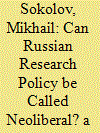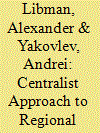|
|
|
Sort Order |
|
|
|
Items / Page
|
|
|
|
|
|
|
| Srl | Item |
| 1 |
ID:
180472


|
|
|
|
|
| Summary/Abstract |
National research evaluation systems that use metrics for the assessment of academic institutions are usually regarded as exemplifying the same neoliberal model of governance that, with minor variations, is implemented worldwide. This essay argues, however, that despite apparent similarities, metrics are used for different aims in different national cases. It compares the use of figures in the UK RAE/REF, a prototypical neoliberal framework, with various schemas of assessment that have been used to evaluate Russian universities in recent decades. It argues that in the RAE/REF, the principal role of statistics is to solve ‘the lazy agent’ problem by creating a prisoner's dilemma for academic institutions, while in the Russian case, statistics serve to solve ‘the corrupt knower’ problem, preventing collusion between the assessor and the assessed. The essay concludes by putting forward some hypotheses on the origins of different approaches to quantification.
|
|
|
|
|
|
|
|
|
|
|
|
|
|
|
|
| 2 |
ID:
180478


|
|
|
|
|
| Summary/Abstract |
Since 2012, with a view to strengthen the development of strategically important regions, Russia has established several federal agencies responsible for these territories. The essay investigates one of these agencies: the Ministry for the Development of the Far East (Ministerstvo Rossiiskoi Federatsii po razvitiyu Dal’nego Vostoka). We identify two main trade-offs associated with the governance approach used in Russia—between federal power and local knowledge, and between bureaucratic expertise and novel ideas—and examine how the ministry has dealt with these trade-offs and their consequences for the ministry’s performance.
|
|
|
|
|
|
|
|
|
|
|
|
|
|
|
|
| 3 |
ID:
180477


|
|
|
|
|
| Summary/Abstract |
This essay examines the role of civic tech in contemporary Russian governance through a data-driven analysis of the ‘Active Citizen’ platform deployed in Moscow. It shows that the way in which polls are conducted on the platform has various consequences, from serving the city administration’s PR needs to shuffling the power balance in various policy areas and effectively disempowering certain stakeholder groups, as well as helping the administration to increase control over a policy domain. At the same time, some platform uses actually empower citizens by engaging them in decision-making and offering grounds for further mobilisation.
|
|
|
|
|
|
|
|
|
|
|
|
|
|
|
|
| 4 |
ID:
180473


|
|
|
|
|
| Summary/Abstract |
We examined the role of peer review in the quality assurance system developed for the regulation of higher education institutions in Russia. Given their negative attitude towards the state’s attempts to increase control over universities, how can the participation of academics in regulatory activity be explained? This essay applies resource allocation theory to suggest that engagement in academic service might depend on an individual’s performance of their core professional task: research. Results indicate that Russian academics who perform relatively poorly with respect to publications and citations in selective journals are more likely to engage in academic citizenship in the form of inspections.
|
|
|
|
|
|
|
|
|
|
|
|
|
|
|
|
| 5 |
ID:
180476


|
|
|
|
|
| Summary/Abstract |
This essay is focused on the analysis of several success stories of state-directed developmental projects and programmes in Russia, which are designed and implemented amid conditions of bad governance. I argue that these success stories do not serve as exceptions to the general rules of bad governance but rather confirm its overall tendencies. The prioritisation of state support for successful projects and programmes is related to conspicuous consumption of material and symbolic benefits by the political leadership against the background of mediocre policy outcomes beyond the ‘pockets of efficiency’ intentionally designed by authorities. The analysis of several success stories related to technological development and the advancement of higher education addresses the questions of why they were short-lived and resulted in diminished returns and/or weak multiplicative effects. Thus, success stories become the other side of the coin for bad governance: these achievements are intertwined with the general trends of governing the state.
|
|
|
|
|
|
|
|
|
|
|
|
|
|
|
|
| 6 |
ID:
180471


|
|
|
|
|
| Summary/Abstract |
It is a given that the quality of governance makes a difference. It determines the developmental trajectories of states and it influences the everyday lives of their citizens. Why are some countries governed worse than others? In particular, why is contemporary Russia governed so much worse than one would expect, judging by its degree of socio-economic development? In comparative perspective, Russia is an example of a high-capacity authoritarian state, which exhibits the major features of bad governance, such as lack and/or perversion of the rule of law, rent-seeking, corruption, poor quality of state regulation, widespread public funds abuse, and overall ineffectiveness of government (Gel’man 2017, p. 498). These features have been demonstrated in numerous recent assessments of Russia vis-à-vis other countries, conducted by various agencies. For example, Russia ranked as 137th out of 180 countries in the 2019 Corruption Perception Index.
|
|
|
|
|
|
|
|
|
|
|
|
|
|
|
|
| 7 |
ID:
180480


|
|
|
|
|
| Summary/Abstract |
Russian authorities have been increasingly willing to facilitate apolitical collective action to deal with day-to-day problems. A case in point is community self-organisation, known as ‘territorial self-management’ (TSM), supported by local administrations through cost-sharing and other means. We use a unique dataset on TSM in the city of Kirov to study the causes and consequences of this phenomenon. TSM accommodates a mix of cultural traits in a given society, combining social capital and awareness of public problems with a scepticism about political participation and a preference for government patronage. TSM increases approval of local government in the supported communities but can also spark broader collective action that restores the agency relation between society and government.
|
|
|
|
|
|
|
|
|
|
|
|
|
|
|
|
| 8 |
ID:
180475


|
|
|
|
|
| Summary/Abstract |
How does centralisation affect public goods provision in Russian municipalities? Drawing on the evidence from 68 interviews with municipal elites in four Russian regions, we demonstrate that, first, centralisation through excessive regulation encourages the provision of a higher quantity of public goods but does not encourage their quality. Short time horizons and haste lower the quality of goods even further. Moreover, centralisation favours municipalities with higher state capacity. Finally, risk-averse behaviour by officials leads to a lower quality of public goods.
|
|
|
|
|
|
|
|
|
|
|
|
|
|
|
|
| 9 |
ID:
180474


|
|
|
|
|
| Summary/Abstract |
Does electoral support affect the quality of public goods provision? In this study, we explore the variety of governance patterns on the level of Russian municipalities from 2012 to 2018. We estimate the effects of budget autonomy and electoral loyalty during federal elections on public goods provision and explore whether elected heads provide better services. Our findings suggest that since elected heads have limited capacity to provide better services, electoral loyalty does not uniformly result in improved public goods provision in municipalities.
|
|
|
|
|
|
|
|
|
|
|
|
|
|
|
|
| 10 |
ID:
180479


|
|
|
|
|
| Summary/Abstract |
This essay considers how the tensions inherent to authoritarian politics structure urban governance in the city of Moscow. The focus here is on urban development policy and the housing renovation programme introduced in 2017. The essay demonstrates a flexible governance arrangement that responds to the interests and ideas of the country’s leadership and involves city-level bureaucratic decision-making, the accommodation of economic interests and expert opinion, and consultations with the public. Such consultations have recently become more significant because of intensive protests paired with the city administration’s belief in participatory urban governance.
|
|
|
|
|
|
|
|
|
|
|
|
|
|
|
|
|
|
|
|
|